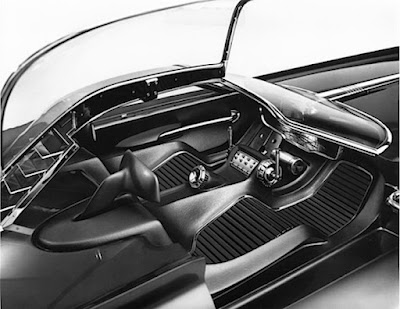Weird 6-Wheeled - Concept cars have always been a beacon of innovation, offering a tantalizing glimpse into the possibilities of the future. These futuristic vehicles not only captivate our imaginations but also inspire advancements in technology, safety, and comfort. While many concept cars have paved the way for standard automotive features, few have been as visionary as the Ford Seattle-ite XXI.
 |
| The
Ford Seattle-ite XXI concept showcased a plethora of groundbreaking
concepts that were ahead of its time, including interchangeable power
units, interactive computer navigation, automatic mapping and
information systems, and a four-wheel steering system. (Picture from: NewAtlas) |
 |
| Ford unveiled the Seattle-ite XXI at the 1963 World's Fair as a concept car (in scaled model) designed with a clear vision of American technology in the year 2020. (Picture from: SixMania) |
The brochure distributed at the World's Fair offered intriguing insights into the vehicle's futuristic features. Keep in mind that this was a time when fuel cells were far from feasible, and microchips had yet to be invented. It stated, "Advanced stylists are not limited in their 'dreams' to designs based on existing facilities or scientific achievements. Unlimited freedom of speculation is the key to progressive car styling. Styling experiments like the Ford Seattle-ite, with many forward-looking features, could result in exciting new concepts of style, comfort, and safety."
 |
| The idea of four steerable front wheels, once a radical concept, is now being considered for its potential to improve tracking, traction, and braking efficiency. (Picture from: NewAtlas) |
The Seattle-ite XXI boasted four steerable front wheels and introduced advanced concepts like a trip programming computer, variable density glass, jalousie windows, and fingertip steering. Its front end could detach from the passenger compartment, transforming it from an economical 60 hp power capsule to a high-speed transcontinental unit exceeding 400 hp. This transformation was controlled by a flexible clutch connected to the passenger compartment.
Fast forward forty years, and fuel cells have emerged as successors to the internal combustion engine, while modular vehicles are on the horizon. The idea of four steerable front wheels, once a radical concept, is now being considered for its potential to improve tracking, traction, and braking efficiency.
 |
| Its front end could detach from the passenger compartment, transforming it from an economical 60 hp power capsule to a high-speed transcontinental unit exceeding 400 hp. (Picture from: NewAtlas) |
The fingertip steering and trip computer programming, which were groundbreaking features of the Seattle-ite XXI, allowed for precise control at all speeds. The display screen provided information on engine performance, road and weather conditions, vehicle position on a scrolling road map, and estimated time of arrival at the selected destination.
Another innovation was the variable density glass surrounding the passenger compartment. This glass provided cool, diffused light, eliminating glare and enhancing the effectiveness of the air conditioning system. These features showcased a commitment to both comfort and safety. The advantages of four front wheels were clear even back in 1962 when Seattle-ite XXI stylists believed they would "greatly improve tracking, traction, and braking efficiency."
 |
| In the cockpit, Ford is strong in anticipation, with a sophisticated GPS system, since this program tactilely, it sets a route that will follow the car alone by displaying the arrival time, as the current systems. The weather and the technical data of the motor will also be posted there. (Picture from: SixMania) |
In summary, the Ford Seattle-ite XXI stood as a pioneering concept car
that provided a window into the future of American technology. Its
revolutionary features, including interchangeable power units, advanced
computer systems, and four-wheel steering, were years ahead of their
era. The enduring legacy of the Seattle-ite XXI serves as a testament to
the enduring impact of visionary innovation in the automotive industry.
 The debate about the application of six-wheeled vehicles, whether in motorsport or on the road, continues to evolve, with designers and engineers exploring the potential benefits of this unconventional configuration. As technology advances, who knows what the future of automotive design may hold?
*** [EKA | FROM VARIOUS SOURCES | NEWATLAS | WOW | 95OCTANE | WIKIPEDIA | SIXMANIA ]
The debate about the application of six-wheeled vehicles, whether in motorsport or on the road, continues to evolve, with designers and engineers exploring the potential benefits of this unconventional configuration. As technology advances, who knows what the future of automotive design may hold?
*** [EKA | FROM VARIOUS SOURCES | NEWATLAS | WOW | 95OCTANE | WIKIPEDIA | SIXMANIA ]Note: This blog can be accessed via your smart phone.

 Logging you in...
Logging you in...